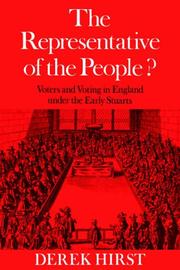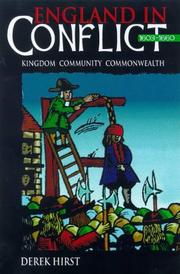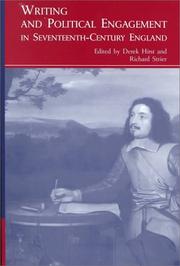| Listing 1 - 9 of 9 |
Sort by
|
Book
ISBN: 0713161558 0713161566 Year: 1986 Publisher: London
Abstract | Keywords | Export | Availability | Bookmark
 Loading...
Loading...Choose an application
- Reference Manager
- EndNote
- RefWorks (Direct export to RefWorks)
Great Britain --- England --- History --- -History --- -Social conditions --- -Great Britain --- -History of the United Kingdom and Ireland --- anno 1600-1699 --- Social conditions --- History of the United Kingdom and Ireland --- GRANDE-BRETAGNE --- ANGLETERRE --- HISTOIRE --- 1603-1649 (PREMIERS STUARTS) --- COLONIES --- 17E SIECLE --- CONDITIONS SOCIALES

ISBN: 9780521208109 0521208106 9780521019880 0521019885 0511561172 051186485X 9780511561177 Year: 1975 Publisher: Cambridge : Cambridge University Press,
Abstract | Keywords | Export | Availability | Bookmark
 Loading...
Loading...Choose an application
- Reference Manager
- EndNote
- RefWorks (Direct export to RefWorks)
Contested elections became a fact of political life for the first time in early-17th-century England as the gentry pressed for seats in a parliament which was growing increasingly important. Dr Hirst examines politics from the point of view of the ordinary man before the Civil War. He asks what an election and being represented meant: what kind of person voted; how did he vote and why; and what might he gain by it. England was not yet shaped in the oligarchic mould that characterised it in the 18th century, and a striking feature of this period was the extent to which parliamentary politics was open to a large social group. Inflation and peasant survival on the land, and resistance to oligarchy in the boroughs (supported by the parliamentary gentry seeking popular allies for their own political battles), produced a broad rural and urban electorate. The need for votes also ensured that members were relatively responsive to, and representative of, pressures from below. In arriving at this verdict, Dr Hirst challenges the notion that politics in this period displayed a strong sense of direction. At all levels, whether in the means of control employed by the magnates, in electoral procedure, or in voting behaviour, uncertainty was manifest, for contests were unprecedented.
Elections --- Voting --- History. --- Great Britain --- Politics and government --- Arts and Humanities --- History --- Electoral politics --- Franchise --- Polls --- Political science --- Politics, Practical --- Plebiscite --- Political campaigns --- Representative government and representation --- Balloting --- Social choice --- Suffrage
Book
ISBN: 9780199535378 9780199535361 Year: 2012 Publisher: Oxford Oxford University Press
Abstract | Keywords | Export | Availability | Bookmark
 Loading...
Loading...Choose an application
- Reference Manager
- EndNote
- RefWorks (Direct export to RefWorks)
Book
Year: 1975 Publisher: Cambridge-London-New York Cambridge University Press
Abstract | Keywords | Export | Availability | Bookmark
 Loading...
Loading...Choose an application
- Reference Manager
- EndNote
- RefWorks (Direct export to RefWorks)

ISBN: 0340625015 Year: 1999 Publisher: London Sydney Auckland Arnold
Abstract | Keywords | Export | Availability | Bookmark
 Loading...
Loading...Choose an application
- Reference Manager
- EndNote
- RefWorks (Direct export to RefWorks)
Book
ISBN: 1283577453 9786613889904 0191637580 Year: 2012 Publisher: Oxford : Oxford University Press,
Abstract | Keywords | Export | Availability | Bookmark
 Loading...
Loading...Choose an application
- Reference Manager
- EndNote
- RefWorks (Direct export to RefWorks)
Dominion: England and its Island Neighbours c.1500-1707 is a rich narrative history of England's increasing dominance over the cluster of territories that became known as the British Isles. It brings alive a period and a geography remarkable for repeated religious wars and a long colonial struggle as well as for London's emergence as a political, economic, and cultural hub. While Dominion concentrates on English actions and purposes, it pays careful attention tointeractions in Ireland, Scotland, and Wales, and to the pressures of European competition. It does so by drawing on the vibrant recen
History. --- Geschichte 1500-1707. --- Great Britain --- History

ISBN: 0521661757 0521100305 0511518935 0511825730 Year: 1999 Publisher: Cambridge New York Melbourne Cambridge University Press
Abstract | Keywords | Export | Availability | Bookmark
 Loading...
Loading...Choose an application
- Reference Manager
- EndNote
- RefWorks (Direct export to RefWorks)
This volume, first published in 2000, focuses on the relationship between writing and public concerns in seventeenth-century England before, during and after the civil wars and revolution of the mid-century. The distinguished list of contributors represent a variety of disciplines - political scientists, social and political historians and literary critics. They share an intense concern with the relationship between the act of writing and the political and public issues of this extraordinary period. The essays suggest that in the seventeenth-century the private and the public intersected so thoroughly that ostensibly 'private' writing was engaged with public issues and public rhetoric, while on the other hand, political writing was deeply involved with questions of style and inward conscience. This volume illuminates the complex issues of 'public' and 'private', 'art' and 'conscience' in the period.
Poetry --- English literature --- Drama --- anno 1600-1699 --- Early modern, 1500-1700 --- History and criticism --- Politics and literature --- Great Britain --- History --- 17th century --- Politics and government --- 1603-1714 --- England --- Intellectual life --- Authors [English ] --- Political and social views --- Arts and Humanities --- Literature --- Authors, English --- History and criticism. --- Political and social views. --- English authors
Book
ISBN: 9780199655373 0199655375 Year: 2012 Publisher: Oxford : Oxford University Press,
Abstract | Keywords | Export | Availability | Bookmark
 Loading...
Loading...Choose an application
- Reference Manager
- EndNote
- RefWorks (Direct export to RefWorks)
Book
ISBN: 9780521884174 0521884179 9780521711166 0521711169 1139801732 051197602X 9780511976025 Year: 2011 Publisher: Cambridge [etc.] Cambridge University Press
Abstract | Keywords | Export | Availability | Bookmark
 Loading...
Loading...Choose an application
- Reference Manager
- EndNote
- RefWorks (Direct export to RefWorks)
Andrew Marvell is one of the greatest English lyric poets of the seventeenth century and one of its leading polemicists. This Companion brings a set of fresh questions and perspectives to bear on the varied career and diverse writings of a remarkable writer and elusive man. Drawing on important new editions of Marvell's poetry and of his prose, scholars of both history and literature examine Marvell's work in the contexts of Restoration politics and religion, and of the seventeenth-century publishing world in both manuscript and print. The essays, individually and collectively, address Marvell within his literary and cultural traditions and communities; his almost prescient sense of the economy and ecology of the country; his interest in visual arts and architecture; his opaque political and spiritual identities; his manners in controversy and polemic; the character of his erotic and transgressive imagination and his biography, still full of intriguing gaps.
Marvell, Andrew, --- Criticism and interpretation. --- Marvell, Andrew --- Marvell, Andrew (1621-1678) --- Poésie anglaise --- Critique et interprétation --- 17e siècle --- Histoire et critique
| Listing 1 - 9 of 9 |
Sort by
|

 Search
Search Feedback
Feedback About UniCat
About UniCat  Help
Help News
News